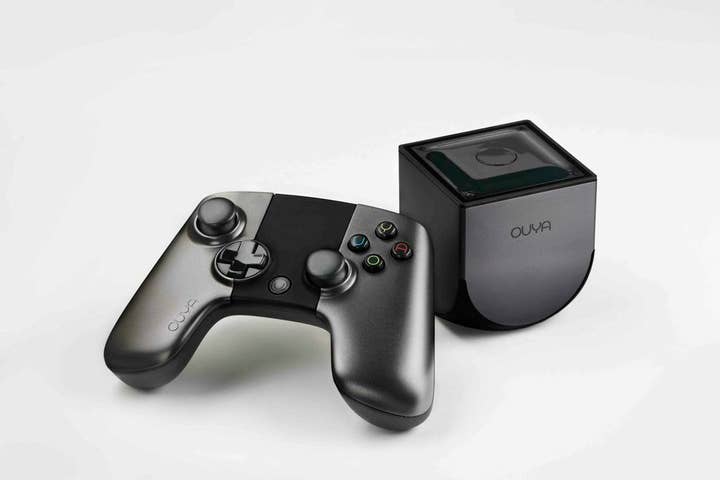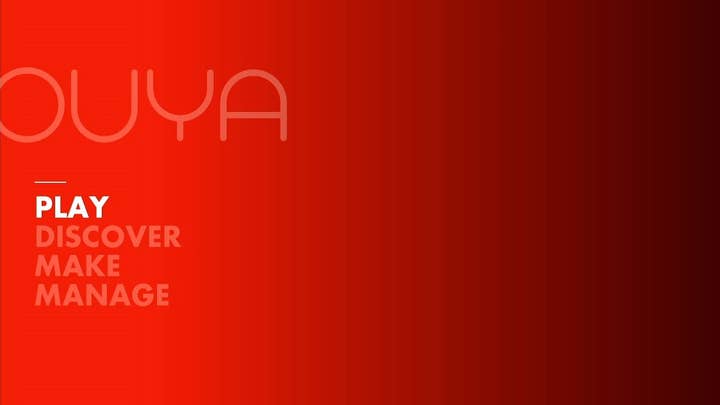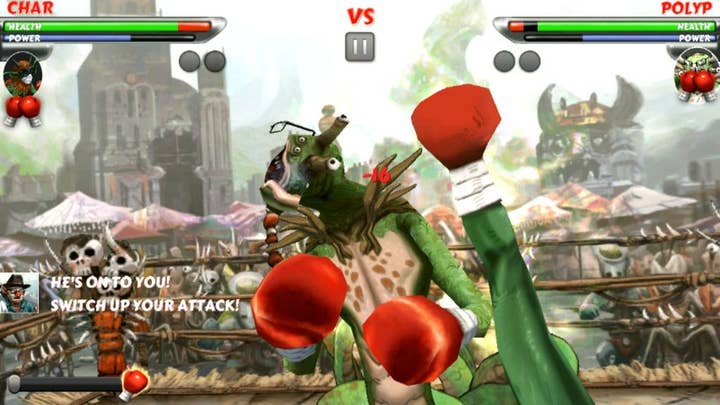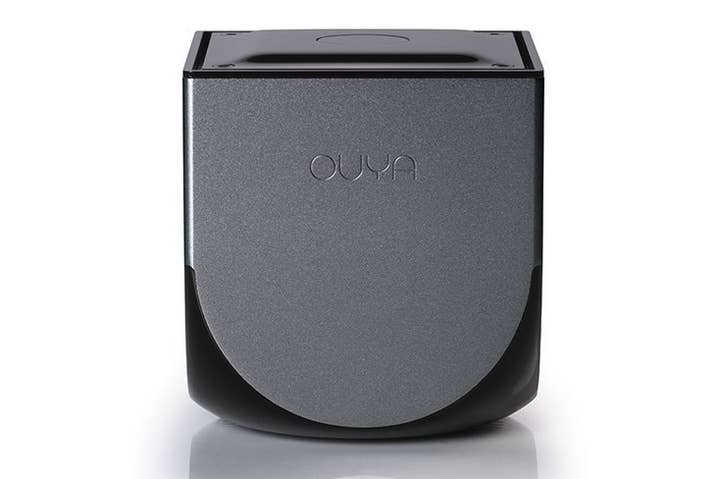Ouya: Room in the market alongside PS4, next Xbox
GDC 2013: console will officially launch on June 4 with "hundreds" of games ready to download and free-to-try; we speak with Julie Uhrman
Ouya, the open Android-based console designed by Yves Behar, is being shipped to its Kickstarter backers today, and the company officially announced this week at GDC that it will hit retailers in the US, UK and Canada on June 4. Ouya is promising "hundreds" of titles for the June 4 release and the $99 console will be available at Amazon, Best Buy, GAME, GameStop, Target, and the store on OUYA.tv. Additional controllers will be sold for $49.99. And for digital purchases, consumers will be able to get pre-paid cards with redeemable codes at retail if they wish.
The company said that over 8,000 game developers worldwide are currently developing games, including both up-and-comers and more well known game makers like Square Enix, Double Fine Productions, Tripwire Interactive, Vlambeer, Phil Fish's Polytron Corporation, and Kim Swift's Airtight Games. "The majority of devs so far are experienced devs who've never built an Android game before. About 1 out of 5 have never even built a game before," Ouya CEO Julie Uhrman told GamesIndustry International at a GDC unveiling. She boasted that Ouya "already has more titles a couple months before launch than any console has ever launched with."
The Ouya hardware itself is even smaller than we had previously thought (think Rubik's Cube or smaller), and its sleek design and brushed aluminum is pleasing to the eye. Uhrman, however, stressed the controller more than anything else. "What we spent the most amount of time on is the controller. We really want this to be our love letter to gamers," she said, adding that Ouya focused on the ergonomics, the weight, the feel, and wanted it to be a precise, accurate controller. "This is one of the pieces of Ouya that evolved a lot based on early supporter feedback," she continued.

Apparently, the feedback led to numerous changes on the controller in terms of button placement, and the style of d-pad. The team found out that many preferred a cross-style d-pad than a disc because it's superior for fighting games. Also, the engineers retooled the tension of the analogs and the design of shoulder buttons. And Ouya even made the responsiveness and speed of the center touch pad customizable. In this journalist's hands, it felt comfortable and familiar while playing a few titles.
After showing off the hardware, Uhrman dived into the user interface of Ouya. The whole UI is incredibly streamlined, with four categories and an apps-like layout. The four categories are Play, Discover, Make, and Manage (which is for settings). Play is simply where anything you've downloaded - games or music or video apps - will be placed. Discover is the store, and it's been designed to encourage people to "find the best games." For example, sub-selections in Discover include featured channels like Go Retro, Hear Me, Genres, and Sandbox. The plan is to offer more descriptive names for games within genres.

"The way games get exposed in the genre list is based on what we call the O-rank, which is our fun algorithm. It's how we rank great games. A lot of app platforms today use downloads as a metric or they use revenue as a metric and we don't think that's a good way to say if it's a good game," Uhrman said. "You could download a game and never play it again. And with the free-to-try model, revenue isn't necessarily the best model either. What is [a good metric] is what proves that the game is fun, and that's engagement. So things like how long you have played a game, how many times you've played that game over a certain period of time. How quickly from the time you boot up Ouya, which is an always-on device, do you play that game... It's those types of engagement metrics that we think prove it's a fun game."
Another interesting area within Discover is Sandbox, which offers developers an opportunity to put builds up and ask people to thumb it up. The idea is for great games to get out of the Sandbox and be searchable and merchandized. It encourages developers to market their games and promote them to fans. Once you get out of Sandbox you know the people next to you have great quality games, Uhrman explained.
"Core gamers on average own more than one console. We don't really think it's an either/or situation. We're offering something different - I think they're going to want Ouya too"
Julie Uhrman
The Make channel is an area that appears to still be in flux. Uhrman said the goal is to serve two audiences, gamers and developers, equally. While Make is a place where a developer can upload early builds, over time it'll be a place for devs to communicate with fans. "We also can grow it to be, what if you want to make a game, here's how to market a game, etc. We'll look to devs and gamers for feedback on how to evolve the section," Uhrman said.
A console that's as open as Ouya should have a fairly simple submission process for developers right? Uhrman confirmed that it's not overly complicated and should be something most can complete within an hour. "It's something we thought a lot about given that we're an open platform... but we wanted to make sure that there are good quality games, at least to the extent that it was optimized to the television and for the controller. So the guidelines isn't necessarily a quality review, but it checks if there's malware, does it break or freeze often, does it use our controller schema in the right way, we need to make sure there's no IP infringement, no pornography, does it elicit real-world violence, you are who you say you are kind of thing - that's the review. We try to keep it under an hour. Developers can choose to go live immediately or they can choose a certain time," she detailed.
Curiously, there's been no partnership reached with the ESRB to rate the games in North America. Right now, the games will be self-rated by devs and community reviewed. Given that Ouya is being sold in mainstream retail, however, we do have to wonder if this will pose potential problems for the company in an atmosphere where some people are still pointing fingers at violent video games. "We'll take it as it comes; right now we want to expose great content from any type of developer and we do have the thumbs-up/like feature or the report if this is abuse on the system," responded Uhrman, adding that "We basically say that we can change the rules at any time and we can reject the game for any reason that doesn't fit our content guidelines - we want everybody on Ouya to have a great experience."
Ratings aside, one of the big questions surrounding Ouya is whether or not it can truly carve out a market for itself in the console space as industry veterans Sony and Microsoft prepare to launch their respective next-generation systems. The games we saw on Ouya are not graphically intense and are very indie in nature. Can Ouya handle high fidelity triple-A releases? Or does it even need to in order to get noticed?
Ouya does has a partnership with OnLive, so that's one way to get triple-A games. "That's one solution. We also support 1080p, hi-def... and we have a USB port so someone can add an external hard drive, so for games that are heavy you could absolutely use that. We have a max download size of 1.2GB for the first download, but as a developer if you want to add and send additional content from your servers you can," Uhrman said.
"Traditional games take longer to develop, and we have some of those in development that we're really excited about. Ouya is not about the number of polygons on the screen," Uhrman acknowledged. "That's not where we went. We wanted to have innovative and creative exclusive content, and we're already starting to see that."
Exclusive content plus a very appealing $99 price point is what could make the system an easy impulse buy for many gamers Uhrman believes. Moreover, Uhrman noted that most core gamers tend to purchase more than one console, so Ouya is likely to be something they'll want to buy even if they are getting a PS4.

"Ouya offers something different; every gamer has a different expectation depending upon the platform and we believe we're going to have innovative, creative games and exclusive games to Ouya... And the barrier to entry at just $99 where every game is free-to-try, I think opens up the opportunity for a number of gamers, even core gamers. Core gamers on average own more than one console. We don't really think it's an either/or situation. We're offering something different - I think they're going to want Ouya too," she said.
A number of traditional consoles in the past have launched selling at a loss. Since Ouya is built with off the shelf components, it may be easier to contain costs, but Uhrman wouldn't confirm that each unit is sold at a profit. "We're really comfortable with our business model," is all she would say.
That said, if things go the way Uhrman would like, this is only the beginning. Ouya will continue to evolve its software and hardware, and the hardware is likely to get refreshed quickly.
"We're like any other software platform that iterates and grows over time, and we'll have a hardware refresh rate more similar to a mobile refresh rate than a console refresh rate because we want to take advantage of the best chips out there and falling commodity prices. We will certainly make sure that there's enough content that's optimized for that chip and we don't push on higher prices to the consumer," she said.
Does that mean some Ouyas in future will not be compatible with certain games? Uhrman is looking to avoid that scenario. "We have a plan where all content will be compatible with future Ouya systems; we don't want to fragment our own market for developers, and we always want gamers to have a great experience," she commented.
Ouya will be interesting to watch. It's a bold move for the industry and everything we've seen so far is completely unconventional. Whether or not that will pay dividends in the long-run is hard to judge at this point in time. "The market is calling us the 'un-console' and we like doing things the 'un-way'," Uhrman remarked.









